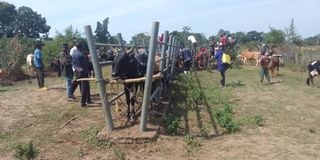Prime
Namutumba begins mass vaccination against Foot and Mouth Disease

Dr Emmanuel Mawogore, a Veterinary Officer, sprays cattle during a mass vaccination of animals in Nakyere village Namutumba Sub-county, Namutumba District on Tuesday. PHOTO/RONALD SEEBE
What you need to know:
- Foot-and-Mouth Disease (FMD) is a highly infectious and potentially fatal viral disease that affects cloven-hoofed animals, including both domestic and wild bovids
- The disease is characterized by a high fever that lasts between two and six days, followed by the formation of blisters inside the mouth and near the hooves. These blisters can rupture, leading to lameness and further complications
Veterinary officials in Namutumba District have initiated a campaign to vaccinate at least one million cattle against Foot and Mouth Disease (FMD) by the end of August.
Foot-and-Mouth Disease (FMD) is a highly infectious and potentially fatal viral disease that affects cloven-hoofed animals, including both domestic and wild bovids. The disease is characterized by a high fever that lasts between two and six days, followed by the formation of blisters inside the mouth and near the hooves. These blisters can rupture, leading to lameness and further complications.
The District Veterinary Officer (DVO), Dr Samuel Kibwika, stated that the campaign follows an outbreak of the disease in some parts of the country, prompting the government to roll out a countrywide vaccination effort.
In Namutumba District, the exercise began in June and was initially scheduled to end in July, but it has been extended to August to ensure all animals are vaccinated. “Over 5,000 cattle out of the one million in the district have been vaccinated,” Dr Kibwika said in an interview on Tuesday.
He added, “The exercise is free because the government provided enough drugs. Farmers are reminded to bring their animals to all our gazetted vaccination centers in the district. We are also spraying ticks because infections from ticks cause death in animals.”
Dr Kibwika further encouraged farmers to bring goats, pigs, and sheep, as they are also prone to Foot and Mouth Disease.
The Namutumba Sub-county Veterinary Officer, Dr. Julius Mwanja, said they are using a vaccine called FMD, which contains FM1, FM2, and FM3. He cautioned farmers not to expose their vaccinated animals to direct sunlight.
“We caution farmers who have already brought their animals for vaccination against rearing them under direct sunlight because the FMD drugs we are administering do not work under high temperatures and can cause the death of animals,” he said.
Dr Emmanuel Mawogore, another Veterinary Officer, expressed confidence that the current vaccination period is sufficient to meet their target of vaccinating all the animals in the district. Vaccination is taking place at all cattle dips in the district's 20 sub-counties. However, he noted that farmers often bring only cattle, leaving goats and sheep behind, especially in Kibaale Town Council and Kibaale Sub-county, where more sheep are reared compared to cattle.
Namutumba District LC5 Chairperson, Mr David Mukisa, said they routinely carry out sensitization, but farmers allegedly do not take the vaccination of goats and sheep against Foot and Mouth Disease seriously.
Mr Stephen Mukembo, a dairy farmer in Nakyere Village, said farmers value cattle more than goats and sheep to the extent that they do not mind losing the latter. Mr William Maganda, also a dairy farmer, said they do not receive enough sensitization about vaccinating sheep and goats.
The disease is endemic in Uganda, with livestock movements through porous borders playing a key role in the spread of transboundary animal diseases.
Namutumba last experienced a serious outbreak of the disease in 2017, which led to restricted movement (quarantine) of animals within and outside the district. Subsequent vaccinations were carried out in 2017, 2018, and 2023, following an outbreak in the districts of Butaleja and Budaka. During that time, traders turned to the Teso Sub-region for animals for slaughter, increasing the retail price of beef from Shs12,000 to Shs14,000 per kilogram.




